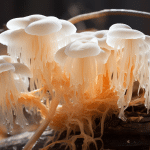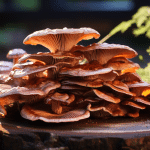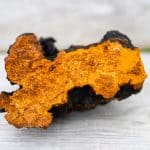We review recent research into lion’s mane mushrooms and its interactions with prescription drugs. While lion’s mane is completely safe for most people, it can interact with some diabetic medications and blood thinners. Let’s get into to the details.
Lion’s Mane Drug Interactions
Lions Mane mushrooms may interact with medications that work to slow down blood clotting, such as antiplatelet and blood thinner medications. The mushrooms can have antiplatelet and antihyperglycemic effects, so you should use with caution if you are taking an antidiabetic medication or a medicine that slows down blood clotting.
Lion’s Mane and Anticoagulants Medications
Hericium erinaceus mushroom extract was shown to exert inhibitory effects on collagen-induced platelet aggregation. Since platelet aggregation is responsible for blood clotting, the extract from lion’s mane may be able to slow down the body’s ability to create blood clots. While this should cause no problems, and could even be beneficial to healthy, normal people, people already taking medication like blood thinners, which also slows blood clotting, could see problems like slower wound healing and more bruising if they begin taking lion’s mane extract on top of that. Always consult with your doctor before consuming lion’s mane if you are already taking an anticoagulant medication.
Lion’s Mane and Antidiabetic Medications
According to animal studies of lion’s mane supplementation effects in diabetes rats, aqueous extracts from lion’s mane mushrooms supplements appear to have an anti-hyperglycemic potential. Although no studies have been conducted on the effects of lion’s mane extract in diabetics, those taking anti-diabetes should exercise caution when taking mushrooms. Both anti-diabetic medications and lion’s mane mushrooms reduce blood sugar, so if you take them both at the same time, you might reduce your blood sugar more than you would expect. To prevent this, be sure to regularly monitor blood sugar levels if you plan on taking lion’s mane. Always consult with your doctor before consuming lion’s mane if you are already taking an antidiabetic medication.
Can You Take Lion’s Mane with Antidepressants?
Lion’s mane mushrooms is known for cognitive functions and general benefits to brain health. One of many benefits that Lion’s Mane has on the mind is the mushrooms ability to alleviate minor anxiety and depression. A double-blind, placebo-controlled study examined the effects of the fruiting bodies of lion’s mane mushrooms on symptoms of depression, with results showing participants taking the dietary supplement of lions mane showed less signs of depression after 4 weeks.
So, lion’s mane helps with depression, but does it get in the way of antidepressants? Although further studies are needed, as yet, there is no study showing lion’s mane use reduces or increases the effects of antidepressants. Regardless, if you would like to try an alternative medicine route alongside conventional antidepressants, make sure you talk with your health care provider first to be sure it’s safe to try as each anti-depressant is different.
Additional Info on Lion’s Mane
Lions Mane medicinal mushrooms (Hericium erinaceus) are known by a number of names, including Monkey Head and Santas Beard. Due to its antioxidant activities and beneficial effects on the body as well as mind, the lions mane mushroom has remained popular as an adaptogenic mushroom for centuries, being used both in traditional Chinese medicine as well as in modern alternative medicine.
You can find our favorite capsules, powders, and tincture’s on the following pages of our website and learn more about each individually:
List of Best Lion’s Mane Supplements
List of Best Lion’s Mane Powders
List of Best Lion’s Mane Tinctures
List of Best Lion’s Mane Gummies
Health Benefits
Research into the health benefits of Lions Mane mushrooms indicates that this mushroom has a considerable potential for neurogenesis (neuron growth) promotion, as well as the prevention and recovery from neural damage. Lions mane mushrooms seem to exert a protective effect on the brain, as it appears to enhance general mental functions and ease neuropathic pain, among other neurological effects.
Who Should Not Take Lion’s Mane?
Lions Mane Mushrooms are usually safe for most people. However, if you are allergic or sensitive to mushrooms, then you will want to avoid Lions Mane. If you experience any signs of allergic reactions (skin rashes or breathing difficulties), discontinue using lions mane and consult your health care provider.
Additional Resources:
Does Lion’s Mane Help With Brain Fog?
Updated 10/10/2022















